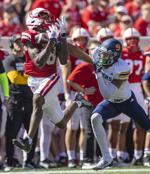
Joe Pick of Bennington (left) carries a box of petition signatures as David Nielsen with Nebraska State Education Association (center) passes one into a Support Our Schools Nebraska truck on July 17. After facing a legal challenge, the Nebraska Supreme Court ruled Friday that voters will decide the fate of a new law that sets aside $10 million of state funds for private school scholarships.
Nebraska's Supreme Court on Friday unanimously struck down a legal challenge that sought to prevent state voters from weighing in this November on a new law that sets aside $10 million of state funds for private school scholarships.
In a 14-page ruling issued Friday morning, the court's seven justices rejected the conservative-backed legal challenge that sought to block the referendum over the new law from appearing on November's ballot.
The expedited ruling — which came on the same day state law requires Nebraska's general election ballot to be certified — came just over a week after a Douglas County mom backed by a pair of law firms challenged the bid to repeal LB1402, which established Nebraska's latest state-funded private school scholarship program.
People are also reading…
Public school advocates backed by Nebraska's largest teachers union gathered more than 60,000 signatures this summer in support of a ballot measure that, if approved by voters, would repeal the portion of LB1402 that established the program.
Nebraska's top election official announced late last month that the effort to repeal the law would appear on November's ballot, prompting the legal challenge in which attorneys argued the referendum effort against the law violates a portion of the state's constitution that prevents voters from repealing laws that make "appropriations for the expense of the state government" or a state institution.
In Friday's ruling, though, the Supreme Court rejected that argument, finding that LB1402 "makes no appropriation at all" and can therefore be subject to a referendum vote.
The ruling paves the way for the referendum to appear on November's ballot — and marks a win for Support Our Schools Nebraska, the teachers union-backed group behind the effort to repeal LB1402 that has gathered thousands of signatures across the state twice in just over a year in two separate efforts to halt so-called "school choice" programs from taking hold in the state, blasting the policies as voucher schemes that threaten public school funding.
Tim Royers, the president of the Nebraska State Education Association, which has led the fight against the Legislature's efforts to use state funds for private school scholarships, said Friday that the group is "thrilled" with the court's ruling.
"The Supreme Court took a very clear step to defend Nebraskans' rights to refer acts of the Legislature to the ballot," Royers told the Journal Star. "Obviously, we're happy that our issue is on the ballot, but we were also concerned about what precedent this could set with what our opponents were trying to argue in this case."
In a statement, Tom Venzor, who represented the referendum's challenger in court and who as the executive director of the Nebraska Catholic Conference, said the decision "hurts the children and families who need support the most— those facing hardships such as bullying, disabilities or the unique challenges of military life."
"Families already struggling to find resources for their children are now left with an uncertain future," Venzor said. "As always, the Nebraska Catholic Conference stands at the ready to advance school choice programs for our low-income families and other families in need."
Arguments made this week
Nebraska's Supreme Court heard arguments from both sides at a hearing Tuesday, when the court seemed broadly skeptical of the legal arguments offered by Venzor, the attorney for Latasha Collar, who filed the legal challenge last week and whose daughter has received a state-funded scholarship to attend a private school in Omaha.
In front of the high court, Venzor argued that LB1402 "clearly constitutes an appropriation for an expense of state government and is therefore not subject to referendum."
The that the referendum seeks to repeal establishes eligibility requirements and sets up the framework of the scholarship program while stating "the intent of the Legislature to appropriate" $10 million annually to be used for the scholarships.
A separate "appropriation" bill, , formally moves the state dollars from Nebraska's General Fund to the state treasurer to be used for the program. The Legislature votes on so-called "A" bills independently from the bills that accompany them.
Justice Lindsey Miller-Lerman, later joined by other justices, repeatedly seized upon that difference at Tuesday's hearing, questioning Venzor over whether the attempt to repeal LB1402 is actually an attempt to repeal an appropriation, since LB1402A — which is not set to be voted on in November — is the bill that actually transfers money to fund the scholarships.
"If 1402A didn't exist, would money be forthcoming?" Miller-Lerman asked.
"Well, 1402A and 1402 are just basically interwoven and intertwined, because it's 1402 and the language that's in that bill that triggers the appropriation that ...," Venzor started, before another justice interjected with a similar question.
"Are they the same act?" Justice Jonathan Papik asked.
In Friday's ruling, the court settled that question, finding that LB1402 is subject to a referendum since the standalone bill doesn't transfer any state dollars, leaving the Secretary of State with "no duty to withhold the referendum based on (the) alleged violation" of the state's constitution.
The ruling paves the way for the referendum to remain on November's ballot — a fate that seemed at jeopardy Monday when Secretary of State Bob Evnen, a Republican who last had certified that the referendum met the legal requirements to appear on November's ballot, reversed course in a court filing.
In the filing, Evnen's attorneys said the state's top election official was siding with Collar's attorneys' argument and and threatening to pull the referendum from the ballot if the Supreme Court had dismissed Collar's legal challenge on procedural grounds this week.
Attorneys for Support Our Schools had argued in a legal brief that Collar's legal challenge to their referendum wasn't properly verified because it was signed by a Texas notary, not one in Lancaster County, where the petition was notarized.
The Supreme Court, though, dismissed the challenge not on procedural grounds, but on its merits — a ruling that Evnen indicated in this week's court filing he would accept.
"If this court rules on the merits of Collar’s arguments, Secretary Evnen will of course abide by that judgment," his attorneys wrote Monday.
In a concurring opinion alongside the court's unanimous order, Chief Justice Michael Heavican questioned whether Evnen would have the authority to decertify the referendum even if he intended to.
"I am aware of no process by which the secretary can change his mind and rescind his legal sufficiency determination and not place the referendum on the ballot," Heavican wrote.
Evnen's office certified the general election ballot — with the referendum on it — Friday afternoon.
The state's top election official had faced criticism over his attempt to reverse his certification of the referendum, including from Royers, who called Evnen "incapable of separating his personal political beliefs with his obligation to serve the public."
Speaking to reporters in the Rotunda on Friday, Evnen said the court's opinion and concurrence included clear guidance for his work certifying elections moving forward.
"I intend to follow the advice given in the concurrence," Evnen said, later declining to speculate what he would have done had the courts remained silent on the matter.
"If things were different, would it be different? Yes, but I don't know, I can't answer that," he said. "I will say that I thought the concurrence provided us with a good direction."
Now, after the court's ruling, Royers said Support Our Schools feels "vindicated."
"After two long years of fighting to get this issue on the ballot, it's just — it's nice to have a definitive answer that we will, in fact, be on the ballot," he said.
Daily Minute: Medical pot petitions challenged; new downtown sports bar; 1st District debate Sunday
Top Journal Star photos for September 2024

Lincoln Christian's Brett Maher (14) sits in the locker room with his teammates ahead of the game against Auburn on Friday, Sept. 13, 2024 at Lincoln Christian High School.

First District Republican incumbent Mike Flood (left) and Democratic challenger Carol Blood debate on Sunday, Sept. 15, 2024, at Nebraska Public Media.

Lincoln Bike Kitchen Executive Director, Shari Shanks, hangs bike pedals on hooks at the new Lincoln Bike Kitchen headquarters inside the old Muny Pool building Monday, Sept. 16, 2024. The Lincoln Bike Kitchen accepts bikes in all conditions and will break unusable ones down for scrap parts.

Gypsy Anton of Lincoln, 13, (from left) listen to music with her brother Silver Anton, 11, mother Jen Leonard, and sister Sophia Leonard, 12, during Porch Jam Sunday near Cooper Park.

Nebraska's Ty Robinson (right) blocks a pass by Northern Iowa quarterback Aidan Dunne (10) in the second quarter on Saturday, Sep. 14, 2024, at Memorial Stadium.

Volunteers Devin Flemming (left) and John Sjuts, of Lincoln, fill bags of food to distribute on Friday, Sept. 13, 2024, at West Lincoln Elementary. The Backpack program allows students in need to take backpacks full of food home.

Nebraska's Jacory Barney (17) dances in the endzone as he celebrates scoring a second quarter touchdown against Northern Iowa on Saturday, Sep. 14, 2024, at Memorial Stadium.

Members of the UNL Army ROTC's Big Red Battalion climb the steps of Memorial Stadium during a silent stair climb in remembrance of those lost in the 9/11 attacks on Wednesday, Sept. 11, 2024, in Lincoln.
Starting at 6:00 a.m., various members of the branches of UNL ROTC, first responders in the surrounding Lancaster areas, and former military members began a silent stair climb workout that involves climbing 2,071 steps, or about 110 flights of stairs. This was the number of stairs that were present at the World Trade Center, which first responders climbed in an effort to rescue people from the towers. The cadets only count the stairs going up, not down. Representing those first responders who never got a chance to descend safely.

Lincoln East's Raheem Popoola (13) leads his team out onto the field before the game against Grand Island on Thursday, Sept. 12, 2024, at Seacrest Field.

Nebraska's Harper Murray (27) embraces Bergen Reilly (2) after scoring a kill against Creighton in the first set on Tuesday at the Devaney Sports Center.

Nebraska's Tommi Hill (6) celebrates a pick-six during the first quarter of the game against Colorado on Saturday, Sept. 7, 2024, at Memorial Stadium.

Nebraska's Jacory Barney (17) celebrates as fans rush the field after the game on Saturday, Sept. 7, 2024, at Memorial Stadium.

Terence "Bud" Crawford (center) takes the field next to Nebraska's Dylan Raiola (left) and Mikai Gbayor on Saturday at Memorial Stadium.

Nebraska fans storm the field after winning the game against Colorado on Saturday, Sept. 7, 2024, at Memorial Stadium. Nebraska won 28-10.

Police investigate the scene of a shooting Sunday in downtown Lincoln near 11th and P streets where one man was killed and another man was injured.

While teammate Dante Dowdell (23) celebrates a touchdown with his teammates, quarterback Dylan Raiola (15) reacts toward the home sideline in the first quarter on Saturday, Sept. 7, 2024, at Memorial Stadium.

Nebraska's Dante Dowdell (23) is tackled by Colorado's Shilo Sanders (21) on Saturday at Memorial Stadium.

Wahoo players pray in the locker room ahead of their match against Ashland-Greenwood on Friday, Sept. 6, 2024, at Wahoo High School.

Lincoln Southeast's Zayvion Campbell (left), Lincoln Southwest's Nathan Mensah (center) and Southeast's Mason Mehta (right) dive after the ball in the end zone during the second quarter on Friday at Seacrest Field. The play resulted in a Lincoln Southwest touchback.

Ian Plumlee, of Lincoln, dances with his daughter, Josephine, 4, as Sandy Creek Pickers performs during the Nebraska Bluegrass Concert Series on Wednesday, Sept. 4, 2024, on Nebraska Innovation Campus.

Jeff Gold speaks after being installed as the University of Nebraska's ninth president during an investiture ceremony in the Capitol Rotunda on Thursday, Sept. 5, 2024.

Junior Dylan Zephier (center) dances with senior Jordyn Guse next to senior Helina Cooper (back left) and freshman Liam Hoffschneider during a Unified music class, Thursday, Sept. 5, 2024, at East High School.

Nebraska's Dylan Raiola walks in the Legacy Walk on Saturday outside Memorial Stadium.

A great blue heron perches on a rock in the shallow water of Holmes Lake on Tuesday.

Nebraska's Leyla Blackwell (11) throws a volleyball into the stands before the match against TCU on Saturday, Aug. 31, 2024, at the Bob Devaney Center.

The Huskers run on to the field to kickoff the game against UTEP on Saturday, Aug. 31, 2024, at Memorial Stadium.

Nebraska's MJ Sherman (48) sacks UTEP's Skyler Locklear (9) during the first quarter of the UTEP game on Saturday, Aug. 31, 2024, at Memorial Stadium.

Norfolk Catholic players line up on the field before during the game against Bishop Neumann on Friday, Aug. 30, 2024, at Bishop Neumann in Wahoo.

Nebraska's Isaiah Neyor (18) catches a 59-yard touchdown pass while defended by UTEP's Jaylon Shelton (9) in the second quarter, on Saturday, Aug. 31, 2024, at Memorial Stadium.

Nebraska's Bergen Reilly (2) watches a husker light show as a highlight reel of last year plays before the match on Friday, Aug. 30, 2024, at the Devaney Sports Center.

New University of Nebraska-Lincoln students run out onto the field during the tunnel walk tradition at Memorial Stadium on Friday.

Lincoln Christian's Truman Paulsen holds the Spirit Sword after defeating Lincoln Lutheran on Friday at Aldrich Field.

Framed through a children's play set, Jordyn Anderson, 3, pushes her friend Jordan Lara, 4, in a Cozy Coupe toy at the playground outside at Las Abejitas' location at First Lutheran Church on Friday. Las Abejitas, one of only two bilingual child care centers in Lincoln, is opening a second location at First-Plymouth Church in September.

Waverly celebrates after defeating Lincoln Lutheran in five sets Thursday at Lincoln Lutheran High School.

Thursday afternoon's football game between Lincoln East and Elkhorn South was postponed due to weather. The teams will make up the game Friday at Seacrest Field.

Lincoln East's Deacon Gehle (from left) and Presley Hall practice passing back anf forth while waiting out a rain delay at Seacrest Field on Thursday, Aug. 29, 2024.

From left, U.S. Sens. Deb Fischer, Pete Ricketts, 3rd District Congressman Adrian Smith, 1st District Congressman Mike Flood and 2nd District Congressman Don Bacon attended the annual summit hosted by the Nebraska, Omaha and Lincoln chambers of commerce on Thursday at Strategic Air Command & Aerospace Museum in Ashland.

Runners, including Tyler Pooschke (first left) and Mak Krause (right) are led by run lead Trevor White (first right) as they take off along the Billy Wolff Trail for the first-ever run held by the Telegraph Run Club on Wednesday. The new run club is meant to be a welcoming, open and free to any who wishes to join.

Nebraska's Nash Hutmacher hands a football back to Henry Erikson of Beatrice, 8, and Brent Erikson during football fan day, Saturday, Aug. 24, 2024, at Hawks Championship Center.















